Sp8de : The game of chance. Changed
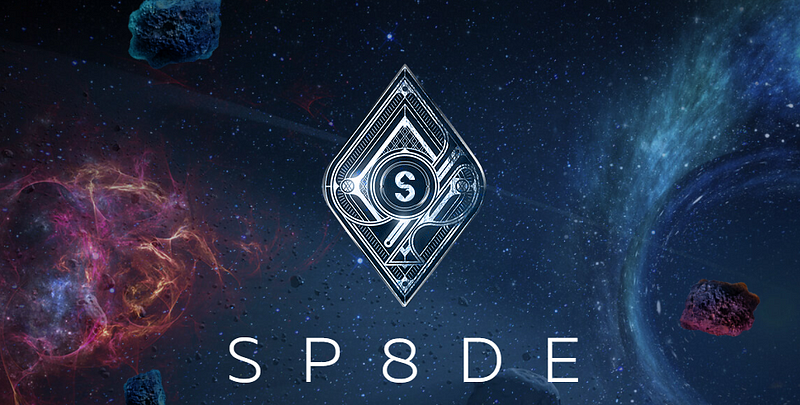
Introduction
Welcome to Spade, a blockchain-based platform capable of supplying unbiased public randomness for developing and running distributed casino applications.
Spade is designed to suit the purposes of all the actors comprising the online casino landscape and as such represents the new breed of digital institutions, a distributed intermediary.
The spark that lit this project and continues to inspire us now, is that early blockchain and Bitcoin casinos simply didn’t get it right. The Blockchain community was younger and wilder, ideals of distributed freedom were burning brighter… still, early adopters who applied blockchain technology to gambling promoted the wrong ideals; those undermining the image of decentralized casinos.
Instead of promoting transparency and cost efficiency that characterize blockchain technology, they promoted anonymity and cyber anarchy. Instead of making the casino for everyone, they kept it to themselves.
By no means are we here to judge. Instead, we are here to change. We do not say that old ways are bad, but can prove that new ones are better. We hold faith in the decentralized future and appreciate the charm of gambling.
We soon realized that there is only a fragile wall of glass between the old centralized gambling and the future global distributed casino. This is it, a simple yet captivating idea.
The future is here: we can run a zero-house edge decentralized casino with close-to-zero transaction fees and provably fair random numbers feeding entropy into a myriad of Smart-Contract-based open source casino applications that can be developed by anyone who has a worthy idea by means of state-of-the art application-specific as well general-purpose programming languages. “We can” was the silent voice of the idea. Now it is the marching echo of “we do”.
As it frequently happens, technological progress made a massive leap forward that went unnoticed by the majority of human kind: people still prefer the traditional narrow-minded and boring online casinos that set draconian house edges and cannot be proven fair.
Once again, no one has the right to judge: it is just an existential business need, produced by a dilapidated business model and an inch of greed.
Worse than this, however, is that even the enlightened ones, those chosen to witness the dawn of the distributed world have noticed a perfect fit between distributed consensus protocols and gambling applications, have synthesized them and nothing.
Some of these projects got infamous due to money laundering accusations, some have spoiled the beauty of the idea by running centralized online casinos and simply allowing for cryptocurrency deposits, others got their moments of fame during TGAs, today, however, few can recall even the names of these projects. Of course, there are some notable exceptions to this rule, but while succeeding locally all these projects have failed to create awareness.
None of them has broadcasted the essential message: “There is no glass wall; the future of gambling is now; we are better in every single quantifiable aspect; if quantifiable is not enough, we also have the powerful idea of the distributed future, while those who are stuck in the past have only a couple of servers and an unaudited poker protocol”.
We will do what no one has done before. Spade is a blockchain-based platform for developing distributed gambling applications. As a platform for gambling applications with self-respect, we are equipped with the protocol for generating fresh unbiased public randomness.
As a team with some aspirations we have it provably fair and completely decentralized. We feel that it is important to be true to the spirit of the venture we embark upon: if blockchain is the universal and undisputed source of truth then it should also be the broadcast channel for randomness.
We think that single points of failure should be perceived by anyone as just a relic of the past. This feature, while setting us aside most starkly, is only a part of what we have to offer in terms of technological
WHAT IS SP8DE
Sp8de is a protocol for blockchain-based platform with multiple features that are essential for the growing blockchain gambling industry and whose solid implementation is lacking in any of the currently existing projects in this space.
SP8DE Vision
In the European Union the online gambling industry grew nearly 19% from the first half of 2015 until the first half of 2016. The casino industry in particular generated over US$2 billion in revenues during this period.
It is expected that until 2020 this number will reach US$2.25 billion per year representing about 12.5% revenue growth [1]. In the US for the period 2015 until 2016 online casino revenues increased by 24.4% and are expected to reach US$4 billion by 2020 [2].
The EU and the US are just a small part of the worldwide casino industry. Globally, the projections of the online casino show that for the period 2017–2025 the market will experience growth of about 130% reaching US$97 billion with cumulative annual growth rate of nearly 11%.
Currently over 6 million adults are officially participating in gambling activities around the world with projections of reaching 10 million by 2020 [3].
Since inception, the blockchain technology was the subject of close attention by gambling enthusiasts. Recent news from The Merkle [4] show how popular online Bitcoin betting has become.
In aggregate the wagers put on online Bitcoin casinos in February 2017 have reached nearly 3 Bitcoin per minute. The price of Bitcoin at the end of February was about US$1,200 while now it is US$5,900 (approximately 292% growth) which means that as of today almost US$715 million worth of Bitcoin was gambled in February alone.
Bitcoin vs The Online Gambling Industry
“Bitcoin Casino” vs “Online Casino” Popularity
In Figure 1 we show how an investment of US$1 would have developed from 2010 until 2017 if it was invested into the giants of the online gambling industry1 [5] as compared to the same dollar being invested in Bitcoin.
Apart from the fact that this investment in BTC would have provided US$70,502 as compared to only $US7.37 when invested in the index, one major observation can be made: the shaded areas show that as the Bitcoin blockchain technology was becoming more and more popular (that is the price of Bitcoin was rising) the traditional online casinos have also gained steam.
However, when we look further in Figure 2 (Google Trends search for “Bitcoin Casino” and “Online Casino”) we see that the popularity of online casinos has been relatively stable and slowly declining since 2004.
Only since the beginning of 2016 when the Bitcoin casinos have started to gain wide popularity did the online casinos see slight increase in interest. In addition, the search “Bitcoin Casino” has skyrocketed since May 2017 when it surpassed the search term “Online Casinos”.
Furthermore, we know of the existence of at least ten relatively sound blockchain-driven casino projects that have entered the industry through a successful TGE and are still being developed.
Although somewhat broad2, this overview points out to an important pattern which holds a lot of relevance for the future of the gambling industry.
Currently, online casinos seem to be only weakly affected by the growth in the interest in Bitcoin gambling and the blockchain-based casinos that at the moment appear to at least complement traditional online gambling.
However, this is happening at a staggering pace and the tendency shows a possibility of blockchain-based gambling taking over online casinos. If the current pace of technological advancement of the blockchain industry is sustained, soon there will be no benefits left for the consumers in the more traditional online casinos.
TOKENS DISTRIBUTION
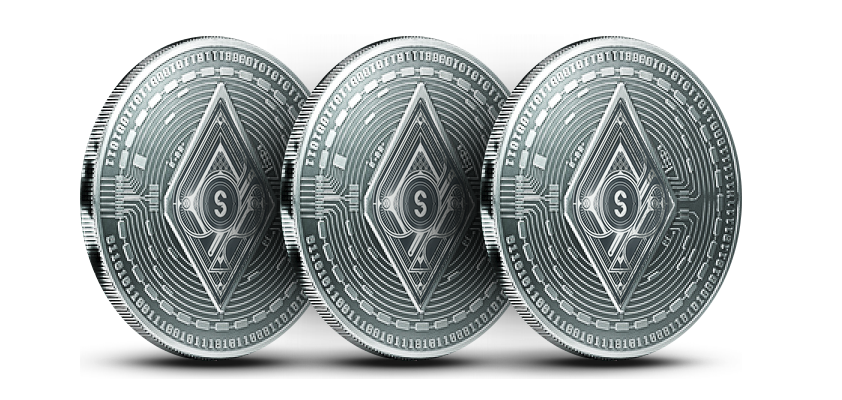
The entire token distribution will be 8,888,888,888 of which 3,655,555,558.4 (41.125%) will be in the form of token sale and 3,455,555,552 (38.875%) will be given as a jackpot to those who have participated in the “token sale” rounds.
The rest of the tokens 1,777,777,778 (20%) will remain with the team for the purposes of marketing, advisory, and further development of the project (see the Token Proceeds Utilization section for further details on the use of the proceeds from the token distribution).
From Table 2 it becomes clear that the SPX tokens received per ETH are decreasing after each sale while the tokens distributed are increasing following the PreSale stage. A soft cap of US$4,000,000 (four million) is set and the hard cap is ~ 49,033 ETH.
The token sale will take place in four rounds and the amounts in each round are as follows:
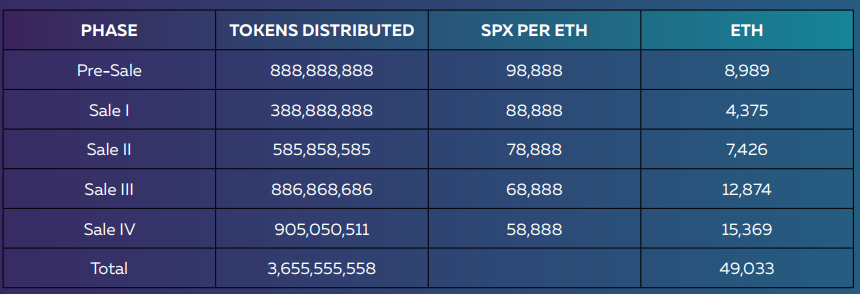
Token Proceeds Utilization
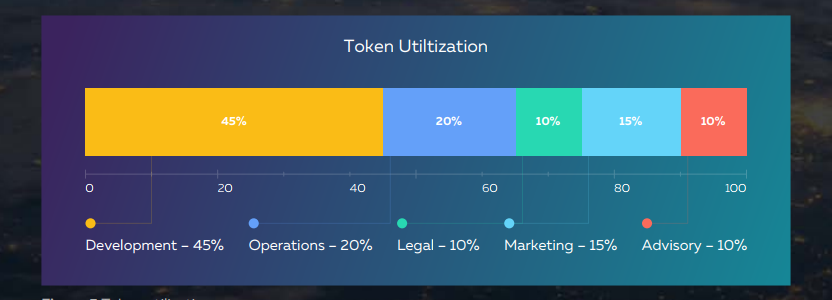
The proceeds of the token sales as well as the tokens that remain in possession of the team will be used to promote and develop the project as outlined in the Road Map section of this paper. In the figure below, we show how the proceeds will be utilized.
As we have shown earlier Spade is development intense, therefore we allocate the majority of the proceeds to development and operations as we believe that proper management and highly skilled developers are in the core of the success of this project. Furthermore, when needed the tokens allocated to the Spade Foundation and the team might be used for further promotion and as part of an incentives scheme.
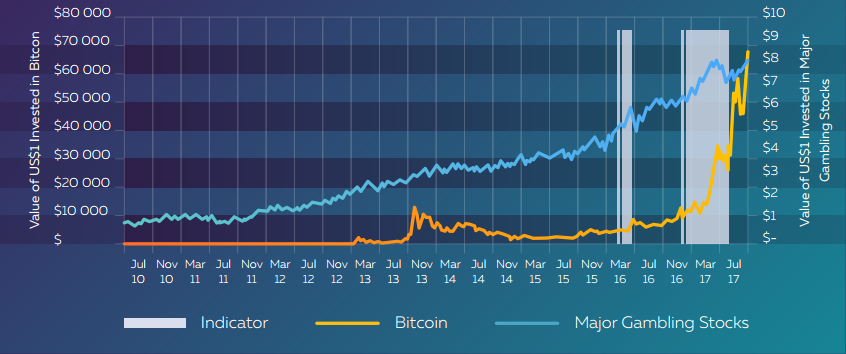
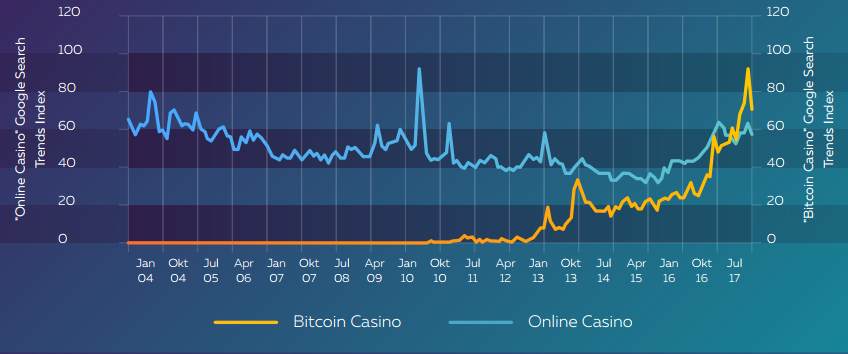
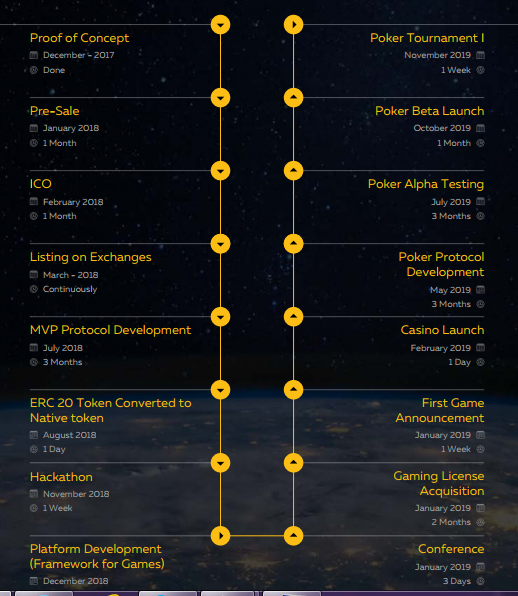
Komentar
Posting Komentar